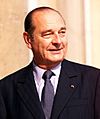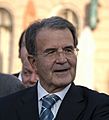30th G8 summit facts for kids
Quick facts for kids 30th G8 Summit |
|
|---|---|
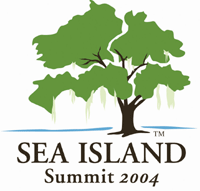
30th G8 Summit official logo
|
|
| Host country | United States |
| Dates | June 8–10, 2004 |
| Follows | 29th G8 summit |
| Precedes | 31st G8 summit |
The 30th G8 summit was a big meeting held in Sea Island, Georgia, United States, from June 8 to 10, 2004. Leaders from some of the world's most powerful countries came together to talk about important global issues.
Contents
What is the G8?
The G8 (which stands for "Group of Eight") was a special club for the leaders of eight major countries. These countries were France, Germany, Italy, Japan, the United Kingdom, the United States, Canada, and Russia. The group started as the G6 in 1975, then became the G7 in 1976 when Canada joined, and finally the G8 in 1997 with Russia. The head of the European Commission also joined these meetings.
The G8 summits were not official government meetings. Instead, they were a chance for leaders to chat and work together on big problems. They wanted to find solutions for things like the world economy and other important challenges.
Sometimes, these big meetings also led to protests. People would gather to share their opinions and try to get the leaders to hear their concerns about different issues.
Who Attended the Summit?
The G8 summit brought together the top leaders from each of the member countries. The 30th G8 summit was the first one for Paul Martin, who was the Prime Minister of Canada at the time.
Main Leaders
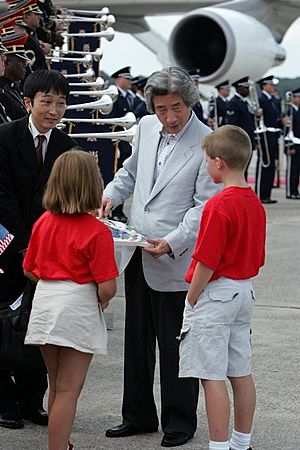
Here are the main leaders who were part of the G8 at this summit:
| Core G8 members The host country and its leader are shown in bold. |
|||
| Country | Leader | Title | |
|---|---|---|---|
| Canada | Paul Martin | Prime Minister | |
| France | Jacques Chirac | President | |
| Germany | Gerhard Schröder | Chancellor | |
| Italy | Silvio Berlusconi | Prime Minister | |
| Japan | Junichiro Koizumi | Prime Minister | |
| Russia | Vladimir Putin | President | |
| United Kingdom | Tony Blair | Prime Minister | |
| United States | George W. Bush | President | |
| European Union | Romano Prodi | Commission President | |
| Bertie Ahern | Council President | ||
Guest Leaders
Other countries and international groups were also invited to join parts of the summit. This allowed for wider discussions on global issues.
| Guest International Organizations | |||
| Organization | Leader | Title | |
|---|---|---|---|
| United Nations | Kofi Annan | Secretary-General | |
What Was Discussed?
The country hosting the G8 summit usually decides what topics will be discussed. Before the summit, experts from different countries work together to prepare a statement. This statement includes all the things the leaders agree on.
The summit was a chance for leaders to talk about their differences and support each other. They often faced tough choices about the economy and other global issues.
Protests and Security
Big events like the G8 summit often bring out people who want to protest. They use these events to share their views on world problems. For the 2004 summit, protests happened in nearby cities like Brunswick and Savannah.
Police and security teams worked together to keep everyone safe. They included local police, the National Guard, and federal agents. They patrolled the streets and watched for any trouble.
In Savannah, some protests were planned, but security forces were ready. They found items that could be used to cause problems. Some protesters were arrested for shouting slogans in front of stores.
In Brunswick, people marched against war and held a peaceful gathering. Later, some protesters tried to get closer to Sea Island, where the summit was happening. The bridge to the island was long and it was very hot. National Guard troops met them at the end of the bridge and even gave them cold water. Most protesters then got on buses to go back to Brunswick. A few tried to go further but were stopped by security.
The protests at this summit were smaller than at some past G8 meetings. This was partly because of the large number of police and military personnel. Some people felt there was too much security, but the governor of Georgia said it was necessary to keep everyone safe.
The Department of Homeland Security (DHS) called the summit a "National Special Security Event." This means they put extra security in place because so many world leaders were there and protests were expected.
Remembering Ronald Reagan
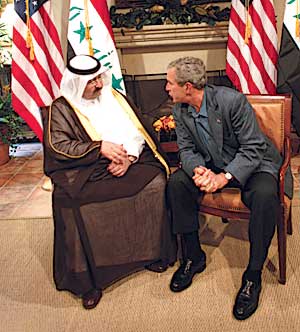
The G8 Summit started just three days after former U.S. President Ronald Reagan passed away. While the summit was happening, President Reagan's casket was brought to the Capitol in Washington D.C. for people to pay their respects.
President George W. Bush was at the summit, so Vice-President Richard Cheney attended the ceremony at the Capitol instead.
Some world leaders at the summit decided to stay longer in the U.S. to attend President Reagan's funeral in Washington. This included German Chancellor Gerhard Schröder, British Prime Minister Tony Blair, and Italian Prime Minister Silvio Berlusconi. They felt it was important to show their respect.
Other leaders, like Canadian Prime Minister Paul Martin and French President Jacques Chirac, couldn't stay because of other commitments. However, they still shared their tributes at the summit.
Economic Opportunities
Hosting a big event like the G8 summit can also create business opportunities. For example, special magazines about the summit were published. Also, a company that provides wireless communication helped set up phones and service for the event. This helped with planning and getting around during the summit.
Images for kids
Core G8 Participants
 | Bessie Coleman |
 | Spann Watson |
 | Jill E. Brown |
 | Sherman W. White |



